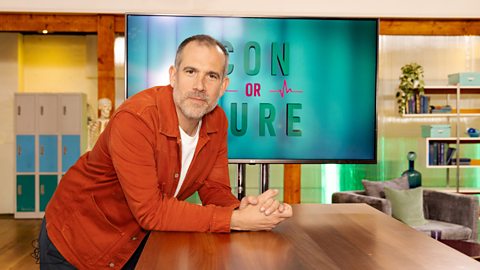Could your genes stop you from being a vegetarian?
There are lots of reasons people go vegetarian, from health to budget and the environment. But cutting out meat can be challenging – and it might be about more than willpower.
By Jessica Bradley

Switching to a meat-free diet can sound easy. After all, we’re a nation who’ve already drastically reduced the amount of meat we eat and there’s loads of plant-based alternatives available in restaurants and supermarkets.
Motivation isn’t lacking, either: as well as having potential benefits on our health, following a vegetarian diet could save us around a third on our food shop.
For some people though, it’s not so straightforward. One 2014 study suggested that of those who turn vegetarian, about 84% go back to eating meat.
This high failure rate is what prompted Nabeel Yaseen, professor emeritus of pathology at Northwestern University Feinberg School of Medicine in the US, to look more closely at what might be going on.
He discovered our genes might be responsible.
Related stories:
The study
Yaseen set out to determine whether a person’s genes play a role in their ability to stick to a vegetarian diet. His study involved data from 5,000 strict vegetarians and almost 330,000 non-vegetarians from the UK Biobank (a database holding detailed lifestyle, genetic and health information of half a million participants).
Yaseen compared the two groups’ genetics by first looking at their single nucleotide polymorphisms (SNPs). SNPs are the most common type of genetic variation among different people, with each SNP representing a difference in a building block of someone’s DNA.
“We found several regions within the genome that seem to be related to one being vegetarian,” he says.
He identified differences in three separate genes, as well as 31 additional genes that are potentially associated. From there, Yaseen was able to make an “educated guess” as to how this might affect someone’s ability to stick to a vegetarian diet.
Several of these genes, including two of the top three, play a role in breaking down and storing lipids (fats) in the body. And while animal-derived foods can have high amounts of protein and calcium content, lipid content can vary hugely between animal and plant sources.
Yaseen suspects that there may be some lipid component in meat that certain people need – especially in the brain, where there’s a lot of lipids – and that this is what prevents them from sticking to a vegetarian diet. But more research needs to be done to confirm this, he says.
“We hypothesise that perhaps the ability to subsist on a vegetarian diet may be related to how one metabolises lipids and how that might relate to brain function.
“We speculate further that maybe there’s a unique lipid component present in meat products that some people need to obtain from their diet. And maybe some other people don’t, so therefore are able to stick with vegetarian diet in the long term.”
Yaseen’s hypothesis could explain why some people start to crave meat when they cut it out of their diets – and that this craving is a mechanism the body uses to influence our behaviour.
There’s research suggesting that food preference is partly influenced by how we metabolise a substance too, Yaseen says.
“It may be that most of us crave meat because there’s a particular need we have for a particular substance in it.”
Veggie toad-in-the-hole
If you crave meaty tastes but want to be a vegetarian, dishes such as this veggie toad in the hole might help

Could future tests tell you if you’re able to be a vegetarian?
There isn’t a genetic test yet that can tell people whether a vegetarian diet is appropriate for them based on their genes, but since there is now evidence showing that there’s a genetic predisposition to be or not to be vegetarian, Yaseen says it’s worth factoring this into your decision to start or stop a vegetarian diet.
“A lot of people have tried to be vegetarian and couldn’t stick with it. You have to listen to your body and feel whether this diet is good for you,” he says.
He hopes that there may be more detailed genetic analysis in the future that will be able to provide people with personalised dietary recommendations regarding vegetarianism. It may also be possible to use this to come up with meat substitutes that contain the lipid component(s) some people may need more than others, Yaseen adds.
“People are motivated by many different things to pursue a vegetarian diet, but many find there’s only so far they can go. We’re hoping to identify nutrients and provide them as supplements that would make for a better meat alternative, to enable able people who want to be vegetarian to be vegetarian.”
Comforting vegetarian recipes
Does other research back these findings up?
While there is no similar research looking at the genetic differences relating to people’s ability to stick to a vegetarian diet, other studies have investigated how genetic variants could lead to some people being better able to follow dietary recommendations that can help prevent health issues such as obesity or type 2 diabetes.
Researchers argue that while our food intake is influenced by many things including social, demographic and religious factors, studies suggest that our inherited differences also play a part in shaping our diets.
In 2021, researchers set out to analyse the main nutrients the body needs, so they could see the genetic regions that influence our diets. They identified more than two dozen which are associated with having a higher preference for high fat, high protein or high carb foods and may affect what people eat.
They analysed the genes and diets of almost 300,000 people and identified 26 genetic regions in the brain that are associated with an increased preference for foods containing more fat, protein or carbs.
The researchers concluded that there are numerous signals to the brain – responses to levels of metabolic hormones and nutrients in our blood, as well as energy expenditure – that can impact how people eat. Genetic variations in these signals can lead to some people feeling hunger more often than others, which could make them at higher risk of obesity, for instance.
Vegetable pasta bake
Craving carbs? You won't notice the lack of meat in this veggie-laden dish

How to stick to a vegetarian diet
If you want to stick to a vegetarian diet regardless of your genetic make-up, Lucia Stansbie, nutritionist and member of Nutritionist Resource, advises eating a varied diet with lots of different plants and protein sources. She notes the importance of making sure your meals are still satisfying and flavourful, and that you’re not missing out on calories compared to your previous diet. She recommends avoiding ultra-processed meat substitutes as these won’t have the nutritional value you need.
Still, it’s normal to experience cravings after giving something up, and there are a few things you can do to help scratch that foodie itch.
“Unbalanced vegetarian diets can be carb-heavy, leading to continuous blood sugar highs and lows, a situation that fosters cravings. Adding proteins and healthy fats can help curb this.”
Protein-rich vegetarian recipes to help ease cravings
If you still find yourself really hankering for meat or fish, there may be good reason.
“Strong food cravings should be listened to as they might indicate nutrient deficiencies, which should be addressed,” says Stansbie. “It might indicate the lack of one specific amino acid or an unbalance between them, which can be addressed by combining different plant-based protein sources.”
For some of us though, a strict, full-time vegetarian diet just might not be the best option.
“Eating should be a pleasurable experience and forcing yourself to stick to a regime or cut out certain foods, even if you want to, can be counterproductive in the long term,” she says.
“If sticking to a vegetarian diet is important for ethical reasons but meat cravings are irresistible and functional testing is not an option due to costs or availability, I’d suggest considering organic and ethically reared meat sources once in a while.”
Originally published February 2024



